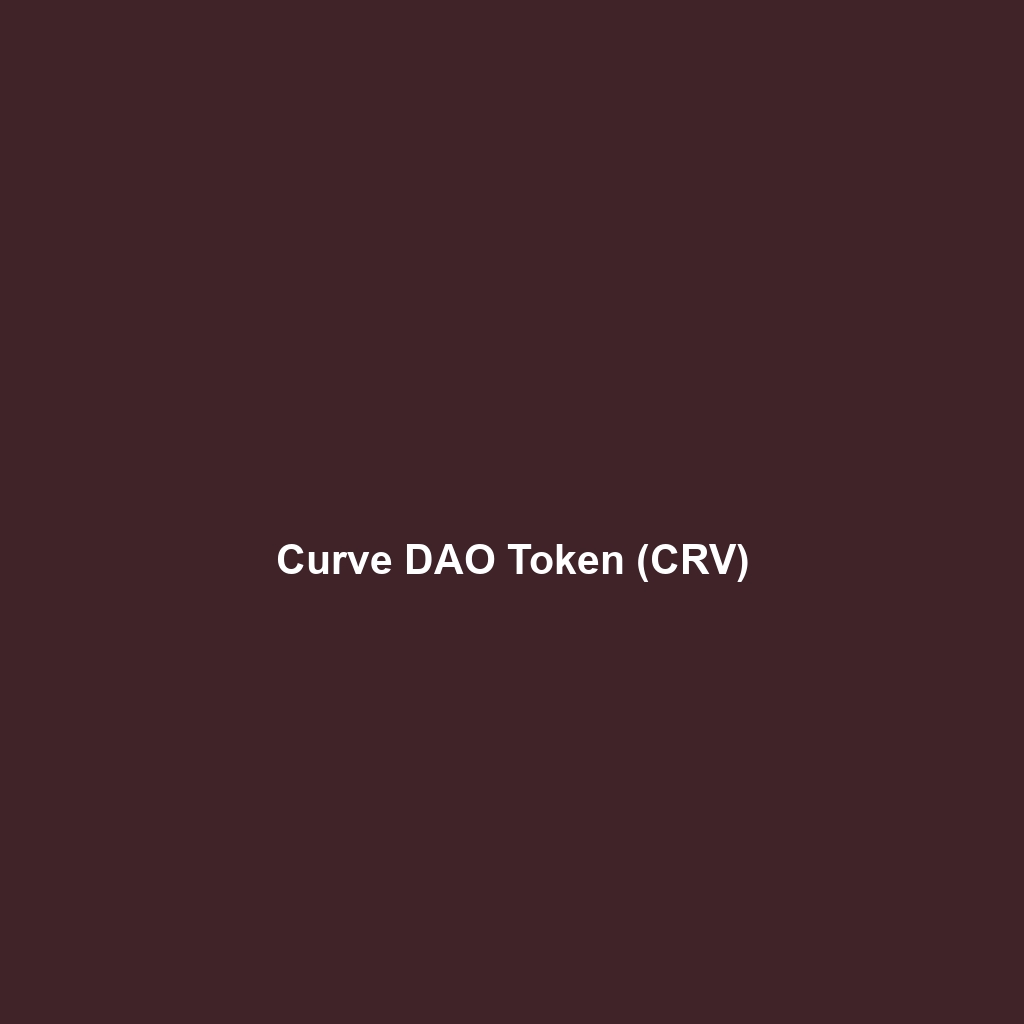Your cart is currently empty!
Tag: Ethereum blockchain

Curve DAO Token (CRV)
Curve DAO Token (CRV) – A Comprehensive Overview
Name and Ticker Symbol: Curve DAO Token, represented by its ticker symbol CRV, is a native cryptocurrency of the Curve Finance platform.
Founders, Launch Date, and History
Curve Finance was founded by Michael Egorov, a prominent figure in the decentralized finance (DeFi) space, in January 2020. Since its inception, Curve has quickly evolved into one of the leading liquidity protocols, designed to facilitate efficient stablecoin trading. Key milestones include achieving over $3 billion in total value locked (TVL) within the first year of its launch and integrating with various DeFi projects to enhance its liquidity pools.
Blockchain Platform
Curve operates on the Ethereum blockchain, providing a layer 1 solution specifically optimized for stablecoin transactions. This allows for low slippage and efficient automated market-making, making it a favored platform for decentralized trading.
Purpose and Use Case
The primary purpose of the Curve DAO Token (CRV) is to serve as the governance tool for the Curve platform. It enables users to participate in the decision-making process concerning protocol upgrades, liquidity mining distributions, and other critical governance matters. Additional use cases include incentivizing liquidity providers and facilitating seamless conversions between various stablecoins.
Technology and Consensus Mechanism
Curve utilizes automated market maker (AMM) technology, which is a core part of its operational infrastructure. While Ethereum uses a Proof of Work (PoW) consensus mechanism, transitioning to Proof of Stake (PoS), Curve leverages Ethereum’s security framework while enhancing liquidity through its custom algorithmic trading strategies.
Supply and Tokenomics
CRV has a maximum supply capped at 3 billion tokens, ensuring controlled inflation and a long-term incentive for participants. As of October 2023, the circulating supply is approximately 1.7 billion CRV. Token holders can earn staking rewards by locking up their tokens to earn additional CRV and participate in governance. Curve also implements a burn mechanism that reduces the overall supply when tokens are used in specific governance actions.
Use Cases and Adoption
Curve has achieved notable adoption across the DeFi landscape, with real-world applications including liquidity provisioning for stablecoin swaps. Major platforms, such as Yearn Finance and Aave, have integrated Curve€„¢s liquidity pools, further solidifying its position within the DeFi ecosystem.
Market Performance and Metrics
As of October 2023, CRV’s market capitalization stands at around $1.2 billion, making it one of the top-performing altcoins. Historical price trends indicate substantial volatility, with notable peaks during the DeFi boom earlier this year, followed by corrections. Trading volumes have remained robust, showcasing sustained interest from investors.
Where to Buy and Trade
CRV is available for trading on various centralized exchanges (CEXs) such as Binance, Coinbase, and Kraken, as well as decentralized exchanges (DEXs) like Uniswap and SushiSwap, allowing for a versatile trading experience.
Security and Risks
As with many DeFi projects, Curve has faced security scrutiny, including concerns over smart contract vulnerabilities. However, no significant hacks have been reported since its launch, emphasizing its robust security architecture. Regulatory risks also loom large in the crypto space, with compliance standards continually evolving.
Community and Governance
Curve employs a decentralized governance model, allowing CRV holders to influence protocol decisions actively. Community engagement is high, with numerous proposals discussed and voted on within the Curve community forums.
Competitors and Differentiation
Curve competes with other DeFi projects such as Uniswap and Balancer; however, its focus on low-slippage stablecoin swaps sets it apart. Furthermore, its unique liquidity pools tailored for stablecoins appeal to a specific segment of the crypto trading community.
Roadmap and Future Developments
The future looks promising for Curve with several enhancements planned, including integrating with new stablecoins and introducing layer 2 scaling solutions to improve transaction speeds and reduce fees. Partnerships with other projects in the DeFi space are also in the pipeline, which could boost its liquidity and user engagement.
Wallet Compatibility
CRV tokens can be stored in multiple wallets, including popular choices like MetaMask, Ledger, and Trust Wallet. This compatibility enhances user flexibility in managing their crypto assets.
Regulatory and Compliance Status
As a decentralized platform, Curve operates in a somewhat ambiguous regulatory environment. While there have been no major legal challenges reported, the ever-changing regulatory landscape poses a potential risk for future operations.
Recent News and Updates
Noteworthy updates include Curve’s recent expansion into multi-chain deployments and partnerships that enhance liquidity offerings. These developments highlight Curve’s commitment to remaining at the forefront of DeFi innovation.
Summary and Call to Action
In summary, Curve DAO Token (CRV) stands as a leading player in the decentralized finance sector, showcasing innovative liquidity solutions and a strong community-driven governance model. Its focus on stablecoins and AMM technology positions it uniquely in a competitive market. For investors and crypto enthusiasts seeking opportunities within the DeFi landscape, Curve DAO Token merits close attention.
For additional insights, visit UpCube.net. Additionally, you can explore more about Curve DAO Token through its official website or its whitepaper.

Civic (CVC)
Civic (CVC) Cryptocurrency Overview
Name and Ticker Symbol: Civic is a cryptocurrency that operates under the ticker symbol CVC.
Founders, Launch Date, and History
Civic was founded by Vinny Lingham and Jordan Fried in 2017. The project was launched to address the growing concerns regarding identity theft and data protection as digital identities become increasingly valuable. The Civic platform has achieved significant milestones, including the successful completion of multiple fundraising rounds, culminating in its ICO in June 2017, which raised approximately $33 million. Since its inception, Civic has continued to evolve, focusing on decentralizing identity verification and building a robust ecosystem for secure digital identity management.
Blockchain Platform
Civic operates on the Ethereum blockchain platform, known for its smart contract capabilities. As an Ethereum-based project, Civic benefits from the robust security features of the blockchain while offering a layer of identity verification and authentication services.
Purpose and Use Case
The primary purpose of Civic is to enable secure and private identity verification. Its primary use cases include:
- Identity Verification: Providing identity verification services to businesses and individuals.
- Access Control: Enabling secure access to services without revealing unnecessary personal information.
- Decentralized Identity Management: Allowing users to control their own identity data without reliance on centralized entities.
Technology and Consensus Mechanism
Civic leverages Ethereum€„¢s smart contract capabilities to facilitate secure identity verification processes. The consensus mechanism employed is Proof of Work (PoW), transitioning into Proof of Stake (PoS) in the Ethereum 2.0 upgrade, which enhances energy efficiency and increases scalability.
Supply and Tokenomics
The maximum supply of Civic tokens (CVC) is capped at 1 billion tokens. The current circulating supply is approximately 685 million CVC tokens. The tokenomics includes a staking mechanism that rewards users who hold and stake their CVC tokens to support network security and operations. Additionally, Civic has implemented a burn mechanism to decrease supply and potentially increase the token€„¢s value over time.
Use Cases and Adoption
Civic has partnered with various businesses to offer identity verification services, including security firms, gaming companies, and financial institutions. Real-world applications include:
- Financial Services: KYC compliance and identity verification for banks.
- Healthcare: Secure access to sensitive patient data.
- Online Services: Enhanced user security for online accounts.
Market Performance and Metrics
Civic (CVC) has shown fluctuations in market performance since its launch. Its market capitalization typically ranges in the hundreds of millions of USD. Historical price trends indicate occasional peaks, with significant trading volume spikes during major announcements or partnerships. The cryptocurrency demonstrates typical volatility associated with the crypto market, influenced by broader economic sentiments and specific project developments.
Where to Buy and Trade
CVC tokens can be purchased and traded on several centralized exchanges (CEXs) such as Binance and Kucoin, as well as on decentralized exchanges (DEXs) like SushiSwap. These platforms provide liquidity and facilitate seamless trading experiences for CVC holders.
Security and Risks
While Civic has implemented robust security measures, like any cryptocurrency, it is not immune to risks. There have been instances of vulnerabilities in smart contracts, but to date, the Civic platform has not been subject to major hacks. Ongoing regulatory scrutiny in the crypto space poses potential legal challenges that could affect operations and compliance.
Community and Governance
Civic operates with a focus on community engagement, employing a decentralized governance model that allows token holders to vote on key decisions affecting the platform€„¢s future. This encourages transparency and fosters a collaborative environment where stakeholders have a say in project developments.
Competitors and Differentiation
Civic faces competition from other identity verification solutions like uPort and SelfKey. However, Civic differentiates itself through its established partnerships and a user-friendly interface that simplifies identity verification processes for both individuals and businesses.
Roadmap and Future Developments
Looking ahead, Civic has outlined plans for further enhancements to its platform, including expanded partnerships, improved user features, and increased focus on compliance with evolving regulatory landscapes. Future developments could enhance Civic’s ability to serve various industries more effectively, solidifying its position in the identity verification market.
Wallet Compatibility
Civic tokens can be stored in various cryptocurrency wallets, including popular choices such as MetaMask and Ledger. These wallets provide secure environments for holding CVC tokens while allowing users to interact with the Civic platform.
Regulatory and Compliance Status
Civic has actively engaged with regulatory bodies to ensure compliance with legal standards concerning data protection and identity verification. Challenges include navigating the differing regulations across jurisdictions, which may affect its operations.
Recent News and Updates
Recently, Civic has announced partnerships with several fintech companies to broaden its impact and service offerings. Additionally, upgrades to its platform, aimed at improving user experience and data security, have been key focal points in the latest updates.
Summary and Call to Action
Civic (CVC) represents a unique solution in the rapidly evolving landscape of digital identity verification. Its innovative approach, strong partnerships, and commitment to user privacy position it as an essential cryptocurrency worth following. For anyone considering engaging with blockchain technology and DeFi, tracking Civic’s developments could present valuable opportunities.
For additional insights, visit UpCube.net. You can also find more information on Civic through their official website.
